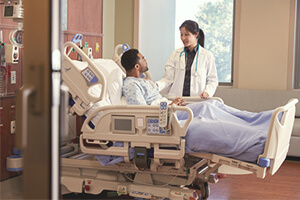Alcohol and Drug Detox Centers

Do I Need Detox?
 Many seek the help of professional detox programs prior to or at the start of longer-term substance abuse treatment programs. Detoxification (detox) centers are a good option for those with various substance dependencies, including alcohol, benzodiazepine, and opioid addictions. When an addicted person stops using drugs or alcohol, they typically experience unpleasant or even dangerous withdrawal symptoms. Detox center professionals can help ease these symptoms and get patients through detox as safely and comfortably as possible to minimize the risk of relapse and facilitate the transition into ongoing addiction treatment.
Many seek the help of professional detox programs prior to or at the start of longer-term substance abuse treatment programs. Detoxification (detox) centers are a good option for those with various substance dependencies, including alcohol, benzodiazepine, and opioid addictions. When an addicted person stops using drugs or alcohol, they typically experience unpleasant or even dangerous withdrawal symptoms. Detox center professionals can help ease these symptoms and get patients through detox as safely and comfortably as possible to minimize the risk of relapse and facilitate the transition into ongoing addiction treatment.
Types of Detox Centers
"Because withdrawal symptoms can be uncomfortable, severe, and sometimes even life-threatening, it is not recommended that those attempting to quit drugs or alcohol do so alone."
The National Institute on Drug Abuse (NIDA) defines addiction as a complex but treatable condition that affects the brain and behavior. While addiction is treatable, no single treatment works for everyone. There are several different types of detox programs available and addicted people should conduct considerable research to determine which program is the best option for their unique needs.
Because withdrawal symptoms can be uncomfortable, severe, and sometimes even life-threatening, it is not recommended that those attempting to quit drugs or alcohol do so alone. Medically assisted detox provides patients with medical monitoring and care throughout the detox process.
In milder cases of addiction, people addicted to drugs may be able to detox simply by meeting with their physician regularly to slowly taper their dose over time in order to avoid withdrawal symptoms. However, when addictions are more severe, patients may need to attend a more structured detox facility for full monitoring and care. In some cases, severe withdrawal may necessitate emergency treatment or a brief stay in a hospital prior to moving on with addiction treatment.
Outpatient
Outpatient detox facilities provide treatment in a medical facility during the day and allow patients to return home each night. They generally cost between $100 and $500 per treatment session, though this price can vary by the length and frequency of treatment. These types of facilities may be most suitable for people with relatively recent or less severe addictions, those with good support systems at home, and individuals with no other complicating medical or psychological issues. Other advantages of outpatient detox centers include:
- Best option for patients with little risk of experiencing severe withdrawal, and therefore will not need intensive 24 hour care.
- Patients can receive greater social support outside of rehabilitation (rehab) by maintaining contact with friends and families.
- Individuals can maintain employment, school, or other personal and professional duties.
- Greater freedom during treatment.
- Fewer disruptions in life activities.
Inpatient
 Inpatient detox centers are similar to outpatient facilities, but care takes place under full-time supervision. Inpatient facilities typically provide similar detox strategies during the day that outpatient centers provide. However, you will receive extensive 24-hour care for the duration of your treatment rather than going home in the evenings. These programs tend to cost $200 to $900 per day depending on the length of the program and amenities offered at the facility.
Inpatient detox centers are similar to outpatient facilities, but care takes place under full-time supervision. Inpatient facilities typically provide similar detox strategies during the day that outpatient centers provide. However, you will receive extensive 24-hour care for the duration of your treatment rather than going home in the evenings. These programs tend to cost $200 to $900 per day depending on the length of the program and amenities offered at the facility.
One of the main advantages of this type of treatment program is that patients are removed from the temptations and old habits of prior drug and alcohol use. This can help decrease the likelihood of relapse prior to treatment completion. Another benefit is the enhanced access to medical services, should they be needed. Those at risk of severe and/or dangerous withdrawal symptoms and drug cravings may benefit most from an inpatient detox center.
If you or someone you know is trying to stop using drugs or alcohol and experiencing severe withdrawal symptoms, consider seeking detox treatment as soon as possible. If inpatient or outpatient detox treatment programs are not readily available, consider seeking emergency medical care immediately.
For information on detox centers near you, call us today. A rehab placement representative can answer your questions and help you find a detox program that is best for you.
Medical Detox Services
There are two main types of detox programs— medical detox and social detox. Social detox provides patients with emotional and psychological support while they withdraw from a substance or substances, but they don’t provide medication or medical care. They typically have to transfer the person to a medical facility in the event of complications. This type of detox is typically used for those who aren’t at risk of experiencing complicated withdrawal and are not addicted to alcohol, sedatives, or opioids.
Conversely, medical detox programs provide patients with medical care, detox medications, and supportive medications. These programs can ensure someone’s safety and comfort during the distressing withdrawal experience. Since withdrawal from alcohol and sedatives can be potentially fatal, due to grand mal seizures, people addicted to either of these substances would highly benefit from a medical detox. They will receive medications that reduce or mitigate withdrawal symptoms and prevent complications. In the event that a complication arises, medical staff can intervene immediately. Although opioid withdrawal is not typically life-threatening, it can be so painful and uncomfortable that many patients choose medical detox to reduce withdrawal symptoms and achieve stability.
Regardless of which type of program you choose, it’s important to seek out professional detox treatment as your first step on the road to recovery. You don’t have to face detox alone.
Types of Detox
Medically supervised detox: Also called medical detox or medically assisted detox, here, you’ll detox under the watchful eye of mental health and medical professionals. You’ll be monitored around the clock to ensure that you safely and comfortably get through detox without having to deal with medical complications or painful symptoms. Depending on the nature of your case, you may be given medication to control your cravings or ease the process.
Social or clinically managed detox: This strategy is non-medical and is only short-term. Depending on where you go for detox, you could simply be given a room in which to detox or you may also have professional support and peer encouragement for the duration of the detox process.
Advantages of Medical Detox
Medical detox is recommended by experts as the best way to detox because it provides:
- Around-the-clock medical supervision, reducing your risk of suffering from medical complications or undue pain.
- Substitute drugs, which are administered to take the place of the substance you have been addicted to. The goal is to avoid withdrawal symptoms.
- A safe environment to detox in, where your chances of a relapse will be non-existent since you’ll have no access to drugs or alcohol.
 Alcohol and drug detox at home can be dangerous. If you quit ‘ cold turkey’, that is to suddenly stop using drugs or alcohol, you could experience serious complications such as severe dehydration and seizures. You might be able to pull it off if you haven’t been using the substance for long and are not physically or psychologically dependent, but, if this is not the case, you’ll be better off seeing your GP or a private rehab counselor.
Alcohol and drug detox at home can be dangerous. If you quit ‘ cold turkey’, that is to suddenly stop using drugs or alcohol, you could experience serious complications such as severe dehydration and seizures. You might be able to pull it off if you haven’t been using the substance for long and are not physically or psychologically dependent, but, if this is not the case, you’ll be better off seeing your GP or a private rehab counselor.
One of the dangers of home detox on your own is you that could relapse if the symptoms get too much to bear. A relapse could lead to an overdose, especially to overcompensate in the hope of dealing with the withdrawal symptoms more quickly. There’s also the factor of reduced tolerance, which tends to happen during this process.
Medications Used during Detox
The medications used during detox vary, depending on the drug you are detoxing from. Some of the drugs you could detox from and the medications used include:
For opiates
- Buprenorphine; also an opiate effective as an opiate replacement.
- Clonidine; an antihypertensive drug that helps with some opiate withdrawal symptoms.
- Methadone; used as an opiate replacement since it’s longer-acting than a number of other opiates.
- Naloxone; used in emergency cases of overdose, as it’s a complete opioid receptor antagonist.
- Naltrexone; used to blunt some of the rewarding effects of opiates.
For alcohol
- Acamprosate
- Naltrexone
- Disulfiram
For stimulants
Desipramine (Norpramin); an antidepressant that is effective for major symptoms of withdrawal.
The Detoxification Process
Your detox needs are different from that of any other person, but there are three major steps which detox typically involves:
Evaluation: The is the stage where you’ll be screened for any mental or physical health issues. You’ll do a blood test to enable the medical team to determine the level of drugs you have in your system and, in turn, how much medication you need if you need any.
Stabilisation: Following the tests, you’ll be stabilized with psychological and medical therapy to prevent any further harm. It’s at this stage that the previously considered medications are prescribed to reduce withdrawal symptoms and prevent complications.
Transitioning into treatment: In the final stage of detox, you’ll be familiarised with what to expect next from the treatment process. If you detox in a rehab facility, you could transition seamlessly into the treatment programme at the rehab, but, if you opt for a detox clinic, you may be given information on programmes you can continue with within other clinics in your preferred areas.
How to Choose a Detox Center
"Recognizing that you need help is the first step in recovering from drug or alcohol addiction."
Choosing a detox center for your drug or alcohol addiction is not always a quick and easy decision. There are several questions you should ask yourself when you begin looking for an alcohol or drug detox center in order to determine which center will best meet your needs and give you the greatest chance of long-term recovery. Some important questions to ask yourself when deciding on a detox center include:
- What amenities would I like the facility to have?
- Will I be allowed to see my family and friends?
- Does the facility accommodate dietary issues?
- Will I be allowed to use my cell phone or computer?
- Does the facility accept my insurance, or will I need to pay out of pocket for costs?
- How far away is the treatment facility?
- How long will my treatment last?
Other tips for choosing the best facility include:
- Researching several facilities before deciding on one.
- Touring each facility and making note of the treatment of patients.
- Talking directly with the people that will be in charge of your care.
- Ensuring that the facility holds values that are well aligned with your own.
- Making sure you are completely comfortable in the facility before committing to the program.
What Happens During Detox?
When you first arrive at the treatment facility, you will go through an intake process. You will be assigned a therapist who will work with you on your recovery. During this process, you will be asked questions about your drug history and prior use. It is important to answer all questions as honestly and completely as possible in order to receive the best care. Your therapist will help devise a treatment plan that is specific to your individual needs. Detox services on their own tend to cost $600 to $1,000 per day, depending on the level of care needed, the severity of addiction, and length of time it takes to detox.
 Once you have completed the intake process, you will be given a tour of the detox facilities so you can easily locate everything. You will then be taken to your room. A counselor will help you unpack your belongings to ensure you do not have any contraband items with you. If you do have contraband items, they will be held until you leave the treatment facility. Such items may differ depending on the facility you attend but they may include any electronics and over-the-counter medications.
Once you have completed the intake process, you will be given a tour of the detox facilities so you can easily locate everything. You will then be taken to your room. A counselor will help you unpack your belongings to ensure you do not have any contraband items with you. If you do have contraband items, they will be held until you leave the treatment facility. Such items may differ depending on the facility you attend but they may include any electronics and over-the-counter medications.
Once you have settled into the facility, you will receive a complete physical exam to identify any underlying conditions that should be treated during detox from drugs. For example, malnutrition and dehydration are common among people addicted to drugs and alcohol, so these issues will be addressed during treatment.
Detoxing from alcohol, opiates, and other drugs can take anywhere from a few days to several weeks, depending on your general level of health, the severity of the addiction, and other factors such as whether or not you suffer from polysubstance abuse. In some instances – such as with alcohol and opioid addictions – you may be given medications to help you deal with the withdrawal symptoms and to help lessen your cravings.
Medications for Treating Alcohol Dependence
According to the NIDA, there are three medications approved by the Food and Drug Administration for treating alcohol dependence. These medications are:
Disulfiram use is reserved for individuals who have already completed their alcohol detox. The drug causes unpleasant side effects such as flushing, nausea, and palpitations when small amounts of alcohol are consumed. These symptoms can last over an hour and are usually enough to deter one from drinking. Its effectiveness is somewhat limited, however, as it requires patient compliance. That being said, it can work quite well for alcoholics that are highly motivated to quit drinking.
Naltrexone helps to control cravings for alcohol by blocking opioid receptors that are involved in the rewarding effects of drinking alcohol. Studies have shown that it can effectively prevent relapse and deter continued drinking behavior in some patients. It may also work well in combination with other medical treatments.
Acamprosate can help individuals maintain sobriety in the long-term by reducing cravings and other associated symptoms of withdrawal such as dysphoria, anxiety, restlessness, and sleep problems. Symptoms of withdrawal can persist for several weeks or months in recovering alcoholics. Acamprosate has been clinically proven to help alcoholics maintain sobriety for long periods of time and for this reason, maybe a good pharmaceutical option for those with severe addiction and dependence.
Topiramate (Topamax) is an anticonvulsant medication with off-label indications for managing alcohol dependence (i.e., the FDA has not approved it for this purpose). Studies have shown that topiramate is effective at reducing drinking compared to a placebo.
Depending on your individual treatment regimen, these medications may be used alone or in combination to help people successfully get through detox and progress through their recovery. Other medications that may be given when detoxing from other drugs (such as opioids) include methadone, naltrexone (useful for both alcohol and opioid dependence), Suboxone (buprenorphine and naloxone), and buprenorphine, which help ease cravings and prevent relapse on a short-term or long-term basis.
Individuals given medications during detox are usually closely monitored to help prevent any adverse reactions. Along with medications to help control cravings and ease withdrawal symptoms, you may be given nutritional supplements, non-opioid pain relievers, sleep aids or other supportive medications to address any other withdrawal-related medical issues, should they arise.
Alcohol and Drug Withdrawal Symptoms
 In many cases, withdrawal symptoms emerge within 12 hours after you have last used alcohol or drugs and, for the most part, fully resolve within about two weeks. In rare instances, some individuals report experiencing more persistent withdrawal effects that may last in the range of months. Some of the general symptoms of withdrawal common to many types of substances include:
In many cases, withdrawal symptoms emerge within 12 hours after you have last used alcohol or drugs and, for the most part, fully resolve within about two weeks. In rare instances, some individuals report experiencing more persistent withdrawal effects that may last in the range of months. Some of the general symptoms of withdrawal common to many types of substances include:
- Irritability.
- Anxiety.
- Mood swings.
- Depression.
- Panic attacks.
- Fatigue.
- Muscle aches.
- Headache.
- Back and joint pain.
- Trembling or shaking.
- Insomnia.
- Nausea.
- Vomiting.
- Difficulty breathing.
- Clammy skin.
- Fever.
- Hallucinations.
Addiction Therapy After Detox
It is important to understand that medically assisted detox is only the first step toward recovery. By itself, detox does little to halt long-term drug or alcohol abuse. In order to maximize the chances of long-term sobriety, addicted people should seek treatment and therapy following detox.
Once a patient is physically able, he should begin attending group and individual therapy sessions. These sessions offer support during and after rehab. Cognitive behavioral therapy can help addicted people identify and cope with triggers that contribute to drug and alcohol abuse.
Group therapy is also an important component of the treatment process. It allows other individuals in treatment to meet in a small group setting that is facilitated by a professional. Individuals within the group are encouraged to share stories of success and to help one another during the treatment process.
Family therapy is often used to help family members deal with the destructive behavior of the addicted person. Family therapy identifies common warning signs and gives families a plan of action on what to do should a relapse occur. It also helps families learn how to be supportive during rehab and recovery as well as find the means to forgive the individual of any past wrongdoings that may have occurred as result of drug or alcohol abuse.
Getting Help for Alcohol or Drug Addiction
 Recognizing that you need help is the first step in recovering from drug or alcohol addiction. Quitting alcohol or drugs is incredibly difficult to do alone. Professional treatment and therapy provides the best chance of success for those struggling with drug addiction or alcoholism.
Recognizing that you need help is the first step in recovering from drug or alcohol addiction. Quitting alcohol or drugs is incredibly difficult to do alone. Professional treatment and therapy provides the best chance of success for those struggling with drug addiction or alcoholism.
For addiction treatment to be most effective, it should address the multiple needs of the individual and not just his or her substance abuse. When seeking a detox facility or rehab center, look for a program that can address your specific needs, such as those offering simultaneous treatment for any underlying mental health conditions, traumas, or other factors that may be contributing to your addiction.
-
Sources
Substance Abuse and Mental Health Services Administration. (2016). Prevention of Substance Abuse and Mental Illness.
Substance Abuse and Mental Health Services Administration. (2006). Detoxification and Substance Abuse Treatment: A Treatment Improvement Protocol, TIP 45.




